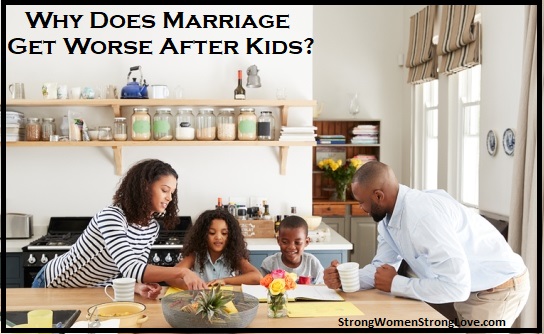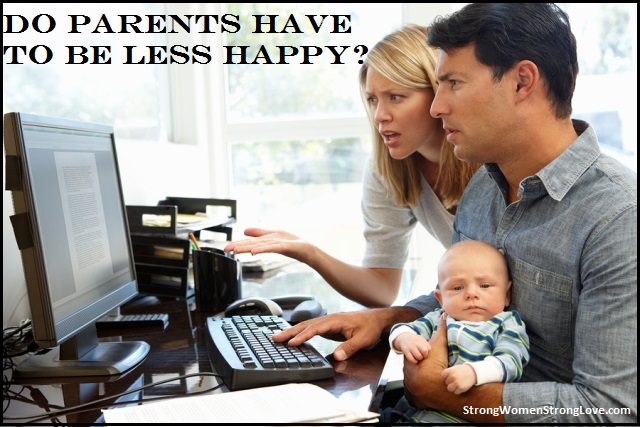by Strong Women Strong Love | Jun 14, 2018 | Parenthood |

Did your relationship go downhill after your kids arrived? You’re far from alone.
Author and psychology professor Matthew D. Johnson doesn’t mince words about it:
For around 30 years, researchers have studied how having children affects a marriage, and the results are conclusive: the relationship between spouses suffers once kids come along. Comparing couples with and without children, researchers found that the rate of the decline in relationship satisfaction is nearly twice as steep for couples who have children than for childless couples. In the event that a pregnancy is unplanned, the parents experience even greater negative impacts on their relationship.
For most people, marital discontent after having kids occurs because of the loss of their intimate friendship with their spouse. This friendship is naturally taken for granted when it’s just the two of you. Maintaining this bond is harder amid all the demands of parenthood. But it’s not impossible. Here are a few strategies for keeping your marriage strong after you become parents.
Moms Are Overburdened
Research shows that the primary childcare responsibilities still fall on women, who also do considerably more housework and spend more hours multitasking than their husbands do. It’s hard to feel romantic and connected to your husband when you’re exhausted or resentful all the time!
Talk openly about household responsibilities and how the two of you and can keep everything from falling on your shoulders. This may mean that your husband takes on additional tasks or that you rework your budget so that you can afford to hire a housekeeping service.
You Need Couple Time
In many families, life revolves around the kids’ schedules, needs and desires. This happens because of parents’ desire to do what’s best for their kids, but this isn’t best for anyone. Children do not want to be — and should not be — the center of the universe. More than additional time, most children need parents who are more relaxed, emotionally attuned to them and involved in a loving, respectful marriage.
As a couple, you need time together to keep your relationship vibrant, but may feel guilty taking away from “family time.” Just remember that if you never prioritize your marriage, it is at greater risk for deteriorating, and that is not good either for you or your children. Children benefit from any effort you put into your marriage. For kids, seeing their parents happy with each other is an extremely stabilizing experience. That steadiness gives them a solid foundation from which to flourish.
Spending time as a couple does not have to break your budget. If you can’t afford a babysitter right now, make sure the kids are in bed early and spend some quality time with your husband in the evening. Have lunch together or take a little time here and there when the kids are in school. If you have friends in the same boat, trade babysitting every few weeks. Give yourself permission to put your needs first at times and bring some fun back into your marriage.
Families Are Overextended
Another way to free up time for your marriage, and to change the whole atmosphere of your family, is to simplify life. As parents, we’re under tremendous pressure to do everything “right” for our kids. There’s an underlying message that you must give them every opportunity to develop their talents and interests and that you must fill their lives with memorable experiences. So we spend hours carting kids all over town to various activities, and we spend money on lessons, tutoring, elaborate birthday parties and over-the-top vacations.
Let me take some of the pressure off: Pushing children to develop every talent and excel at everything is not good for them, especially if you are forcing them well beyond their personal limits. You will not damage, deprive or prevent your child from thriving if you do not provide the “perfect” childhood as portrayed in magazines, parenting blogs and your friends’ social media feeds. Take back control of your parenting so that you and your husband are not frantically attempting to meet the latest fabricated need. Scale back activities to the ones that are truly meaningful for your family.
Despite its challenges, parenting is an experience that is truly life changing. The depth of love you can feel for a child can be absolutely breathtaking, and sharing that bond with your husband can be another source of intimacy. Children have a way of helping us become aware of our place in the life cycle and can bring tremendous joy and meaning to life. Balancing your own needs with those of the vulnerable little humans for whom you are responsible requires tremendous maturity, planning and commitment, but is entirely doable if you stay focused and simplify. Need a guide to caring for your marriage as you nurture your family? Pick up a copy of my book Strong Women, Strong Love.
by Strong Women Strong Love | May 13, 2018 | Parenthood, Personal Power, Quotes |

When a woman makes the choice to marry, to have children,
in one way her life begins but in another way it stops.
You build a life of details.
You become a mother, a wife and you stop and
stay steady so that your children can move.
And when they leave they take
your life of details with them.
And then you’re expected to move again
only you don’t remember what moves you because
no one has asked in so long.
Not even yourself.
~ Francesca ~ The Bridges of Madison County
by Strong Women Strong Love | Oct 15, 2017 | Parenthood, Persistent Pressures |

About one out of every 10 couples has problems with infertility. And, unfortunately, not all of them get the happy ending they sought: conceiving a child together. This can be one of the most painful challenges you and your husband face together.
If your infertility is caused by issues with your body, you might be experiencing guilt or shame. Both men and women often go through feelings like these if they believe they’re at fault for infertility.
You may even be worried that your husband will leave you because you can’t give him the child you had both longed for — and that he’ll seek out another woman who can. Again, such feelings are normal, and they happen to both wives and husbands. Sometimes one spouse even offers to let the other go so he or she can pursue parenthood with someone else.
Believe it or not, in an overwhelming majority of marriages, one spouse’s inability to conceive a child is not a deal-breaker for the other partner. In fact, if managed well, this experience can actually bring a couple closer together. The important thing is to keep the lines of communication open. Talk openly about your disappointments, your feelings, your fears. I’m willing to bet that your husband will tell you that his love for you is unchanged no matter what happens. Believe him.
It’s also vital to talk about what’s next for you as a couple. For many people, parenthood is closely tied to their sense of purpose in life. How true is that for the two of you? Are there other family building options you’re open to considering? Be honest. Do you want to explore other paths to creating a family? Or do you want to create a meaningful life in other ways? There’s no one right answer, of course.
I hope it’s heartening to know that others couple have felt the same things that you’re feeling and that their relationships have stayed strong. I encourage you to explore additional resources for coping with infertility and to work with infertility specialists in your community.
by Strong Women Strong Love | Jul 13, 2017 | Parenthood, Persistent Pressures |

You’ve married a great guy with wonderful children. The only problem? His ex-wife. She stirs up conflicts over the kids — and sometimes it even feels like she’s trying to win your husband back. So how do you deal with an ex-wife who seems to constantly fan the flames of drama? It takes a lot of thoughtfulness, maturity and grace under pressure.
She’s Not Going Away
Let’s start with a dose of reality. A person you didn’t choose to have in your life now plays a big part in it. That might not feel very fair. But, because she and your husband share children, she’s going to be a presence in your world for a while.
As you deal with his ex-wife, it might help to understand the emotions behind her hard-to-take behaviors. She may still be upset that your husband chose to leave their relationship. Even if she was the one who ended their marriage, she may be jealous of the fact that he’s moving on. She may feel insecurity about your being “the other woman” in her kids’ lives. Or she may fear that you’re competing with her or her kids for your husband’s time and financial resources.
It’s not on you to call her out if you suspect any of these issues. But realizing that she’s acting so badly out of hurt and fear — instead of just pure spite or evil — helps you navigate from a place of composure and compassion so that you don’t compound the negativity she creates.
If you have to interact with her in person, a good rule to follow is to try to show the same respect and friendliness you would to a stranger — for example, someone waiting in line with you. But as you resolve to act respectfully, you also have to prepare yourself for the fact that she might not return your kindness and maturity. That’s her problem. Just focus on being the bigger person. She may not appreciate it, but your husband certainly will.
Putting the Kids First
Resentments and power struggles between former and current spouses can play out in conflicts over the kids. You might cringe at the idea of your husband having any interactions with his ex, much less co-parenting with her. But remember that it’s in the best interest of your step-kids if their parents can work out issues together.
If your husband’s ex is making you the bad guy in disagreements over the kids, it can ease some tension to make sure he has primary responsibility for the kids when they’re with you, especially when it comes to discipline. You and your husband may also need to have a clear understanding of where to set boundaries in the relationship the two of you have with his ex. For example, if she’s calling you names or being disrespectful in some other obvious way, some clear limits may need to be set. The two of you will have to decide whether that’s best done by you or your husband. Of course, these decisions are best made when you’re calm and rational.
Also remember what we talked about it earlier: The idea of someone else acting as “mom” to her kids might be driving her crazy. Honor the relationship your stepkids have with their mother. Everyone – you, the kids, your husband, his ex – should be clear that you’re adding to the kids’ family, not replacing their mother in anyway. Hopefully, she’ll realize at some point that her children can only benefit from having more people who love and care for them. But it’s easy to be territorial, especially when a blended family arrangement is new.
Your Husband, His Ex
It’s possible for your problems with his ex to go beyond co-parenting disagreements. If his ex is acting in ways that feel like a threat to you marriage, that’s especially hard. Your anxiety about her (which, of course, she might be trying to provoke) can easily sow mistrust and discord that harm your relationship, so be careful.
Remind yourself that your husband is married to you now — and that there’s a reason he’s no longer married to her. Don’t let your fears take over. Trust him, and remind him of that trust. If the ex pushes your buttons to the degree that you can’t even talk about her with your husband, think about how to work with your emotions so that you can get to a calmer place. Managing your family’s relationship with her should be something you and your husband can communicate about.
Will Things Get Better?
Blended families may require a greater degree of thoughtfulness and intention. However, there is no rule that conflict has to be the norm. Plenty of parents work collaboratively and even amiably with former spouses, but it requires the adults involved to be mature and compassionate. Will you commit to doing your part to create the best environment for everyone involved, especially the kids?
by Strong Women Strong Love | Feb 28, 2017 | Parenthood, Poisonous Patterns |

It’s a crossroads that countless couples have encountered: Their marriage has become unhappy and unsatisfying. But they fear hurting their children by divorcing.
Should you stay in your marriage for the kids, or end it? Both choices are painful. Which one is better?
Each couple has to ultimately decide what’s right for them and their family. But I do believe there’s a wise way couples can approach this life-altering decision.
A caveat before I go on: This advice is for people in unhappy marriages, not relationships that are marked by abuse and aggression. If you’re in a situation like this, please seek professional help.
Have You Given Your Marriage a Real Chance?
For most unhappy couples, the decision about ending a marriage when kids are involved isn’t so clear-cut. You may long for an escape from your marriage, but you also know the stakes are high for both you and your children. A divorce can complicate all your lives for years. And no matter what you decide, you and your husband will still have to co-parent.
Because divorce is a serious decision, it’s not one that you should rush into. Especially since some studies have shown that a good percentage of people who divorce end up regretting their decision.
That’s why my advice to most couples on the brink is to make sure that they’ve done everything they can to save their marriage before calling it quits.
Using the Research on Marriage to Help You
If you’re intent on working on your marriage, there’s very good news. Research has given us clear insight about what makes marriages succeed or fail. If you are determined to give your relationship a chance, you can be smart and focused in your approach. If you’re both willing to put in the work — reading books, getting therapy, going to marriage workshops — you have a better chance than ever of salvaging your relationship.
Have you educated yourself about what makes a marriage work? Do you know about the four horsemen and the best predictor of divorce? If you don’t know what I’m talking about, then you have some work to do.
As a parent, if you do divorce, you want to be able to honestly tell your kids that you did everything you could to try to make the marriage work.
Sadly, not every marriage can be rescued. If that’s the case for you and your husband, you’ll at least have the peace of knowing you were thoughtful in making the decision to divorce, and that it is really the better option for you. You’ll move forward with fewer “what ifs” and regrets. And the efforts you put in should help the two of you with your post-divorce relationship as co-parents to your kids.
If you are looking for ways to work on your marriage, I want to point you toward my book Strong Women, Strong Love. I wrote it to help busy couples nurture their marriage amid their stressed and demanding lives. If you’re ready to seek couples therapy, seek recommendations from people you trust, consult your insurer’s director of providers or browse Psychology Today‘s listing of therapists in your area.
by Strong Women Strong Love | Aug 16, 2016 | Parenthood, Persistent Pressures |

You may have read articles before stating that parents are not as happy as people who don’t have children. Of course, that’s not everyone’s experience with parenthood. But it’s a finding that we tend to explain away with conventional wisdom like “Well, having kids is hard. That’s just what parenting is.”
But that not may be the case.
First, the bad news. According to the latest research on the topic, the happiness gap between parents and nonparents is larger in the U.S. than it is in other developed countries. But here’s the new wrinkle on this topic: Researchers say that it’s possible to close the happiness gap through new policies on work leave and childcare.
It’s rare that social scientists can explain a phenomenon so completely, the lead researcher, Jennifer Glass, PhD of The University of Texas, said in an article for Quartz. But in countries with most family-friendly policies, parents were just as happy as nonparents.
So what does this mean for us parents here in the U.S.?
First, consider something that Glass says about U.S. parents in the Quartz article:
They often find parenting fulfilling, and wouldn’t have it any other way. But their stress levels tend to be high, which can overshadow any happiness to be gained from shepherding another human being through life.
Parenting in our culture is stressful. You aren’t doing something “wrong” if you are having a hard time meeting the demands of parenthood! Because stress comes with the territory of parenting, try these strategies:
- Get support. Be proactive in seeking out support, both emotional and practical. In other words, you need both friends you can confide in about the challenges of parenting and friends who can take your kids to soccer when you can’t.
- Strengthen your marriage. Also, look for ways you can continue to nurture your marriage so that you and your husband can support each other. You need a strong connection with your spouse to weather the stresses of parenting.
- Ask for help. Much of the work of parenting, such as managing the logistics of your kids’ lives, still falls disproportionately on women. If there’s an imbalance of parenting duties in your relationship, ask your husband directly to take on more responsibilities. It’s better to ask for help than to simmer with resentment!
- Advocate. Finally, you can advocate at your company and beyond for policy changes that help parents. Glass’ study found that paid sick and vacation leave were especially powerful ways to increase happiness.







